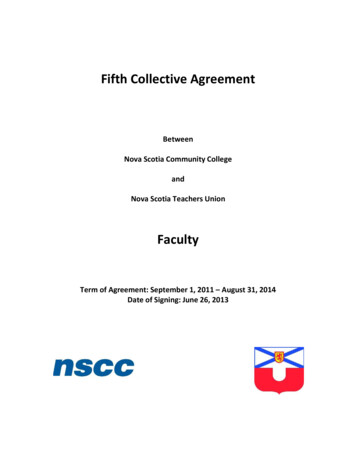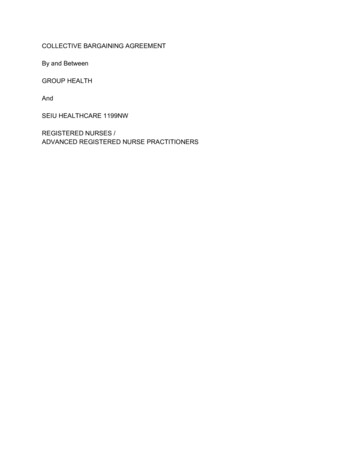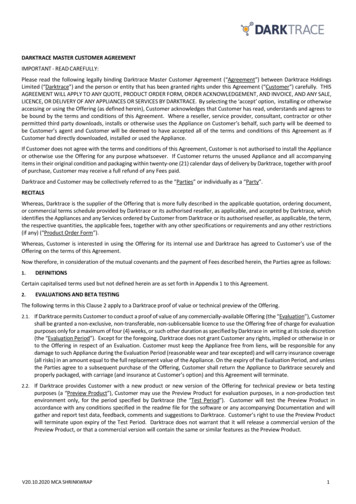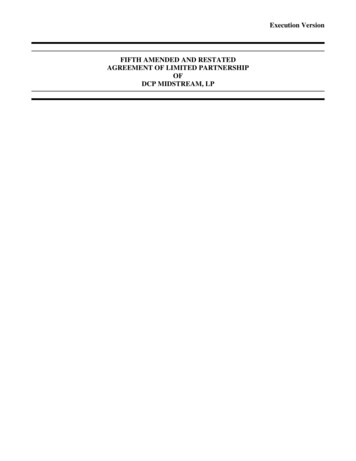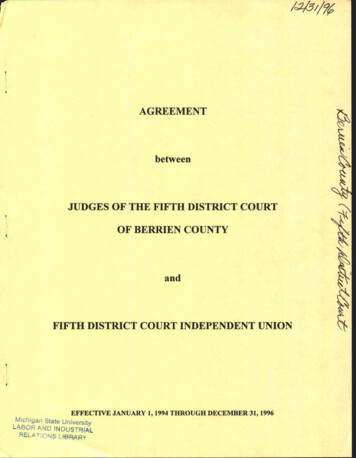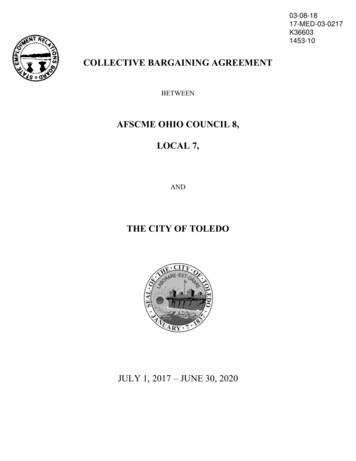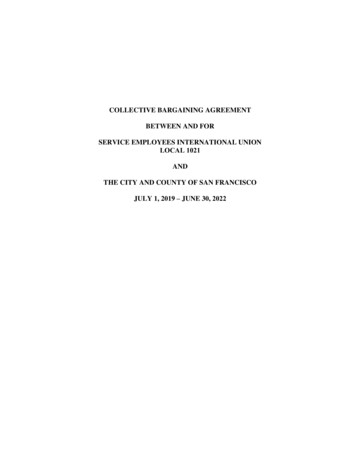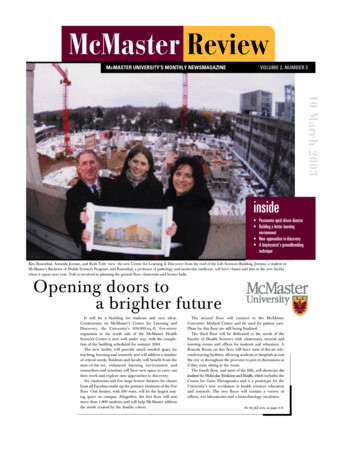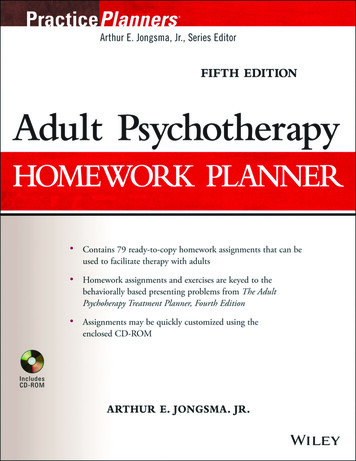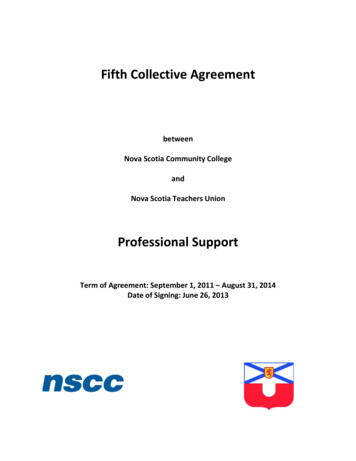
Transcription
Fifth Collective AgreementbetweenNova Scotia Community CollegeandNova Scotia Teachers UnionProfessional SupportTerm of Agreement: September 1, 2011 – August 31, 2014Date of Signing: June 26, 2013
Table of ContentsPREAMBLE1ADMINISTRATION OF AGREEMENTArticle 1:Article 2:Article 3:Article 4:Article 5:Article 6:Article 7:Article 8:Article 9:Article 10:Article 11:Definitions . 2Recognition . 3Application . 4College’s Responsibilities . 4Joint Responsibilities . 4Existing or Future Legislation . 5Harassment and Discrimination . 5Union Information . 6College-Union Committee. 6Printing and Distribution of Collective Agreement . 7Complaint, Grievance, and Arbitration Procedure . 8STAFFINGArticle 12: Workplace Diversity. 13Article 13: Appointment and Termination of Employment . 14Article 14: Position Categories . 17Article 15: Status of Employee . 20Article 16: Reduced Assignment Plan . 26Article 17: Employee Exchange, Secondment, and Temporary Reassignment Opportunities . 28Article 18: Auxiliary Employees. 31WORKING CONDITIONSArticle 19: Duties. 33Article 20: Professional Development: Supporting Excellence in Teaching and Learning . 36Article 21: Employee Performance Review - Building Employee Success . 45Article 22: Professional Support Classification and Salary Plan . 46Article 23: Union Deductions . 47Article 24: Official Employment File. 49Article 25: Continuous Employment, Continuous Service, and Seniority . 50Article 26: Position Reductions, Lay-Off and Reinstatement. 54Article 27: Health and Safety . 64Article 28: Third Party Liability Insurance . 64Article 29: Legal Assistance and Protection . 65Article 30: Discipline . 65i
LEAVEArticle 31: Vacation . 67Article 32: Recognized Holidays . 70Article 33: Sick Leave. 72Article 34: Pregnancy, Parental, Spousal, and Adoption Leaves . 78Article 35: Bereavement Leave . 82Article 36: Special Circumstances Leaves . 83Article 37: Union Leave . 88Article 38: Leave for Union President . 90BENEFITSArticle 39: Retirement. 91Article 40: Re-employment Following Early Retirement . 92Article 41: Health and Welfare Benefits . 93Article 42: Deferred Salary Leave Plan . 94CONCLUSIONArticle 43: Amendment . 96Article 44: Entire Agreement . 96Article 45: Term of Collective Agreement. 97Schedule 1: Professional Support Classification and Salary Plan. 98Schedule 2: Service Award . 109Schedule 3: Public Service Award . 112Schedule 4: College Service Award . 114Appendix 1: Vacation Entitlement Calculations. 115Appendix 2: Health & Welfare Benefits - NSTU Plan . 117Appendix 3: Injury on Duty and LTD (Public Service Superannuation Plan) . 120Letter of Understanding #1: Interpretation of Campus . 120Letter of Understanding #2: Community College Master Agreement. 121Letter of Understanding #3: Effective Date . 121Outline - Article 11: Complaint, Grievance, and Arbitration Procedure . 122Outline – Article 26: Position Reductions, Lay-off, Reinstatment . 124ii
PreambleWhereas the Nova Scotia Community College is a post-secondary institution and is responsible for enhancingthe economic and social well-being of Nova Scotia by meeting the occupational training requirements of thepopulation and the labour market of the Province by offering education and training and related services forfull- and part-time students;AndWhereas the College is committed to becoming a Learning-Centered College, its objective is to provide themost learning-centered experience possible for students;AndWhereas it is the desire of both parties of this Collective Agreement to:(a)promote the well-being of Employees and students so that the people of Nova Scotia will bewell and efficiently served;(b)maintain harmonious relationships among the College, the Union and Employees;(c)settle terms and conditions of employment among the College, the Union, and Employees;(d)create an environment which values and respects all College staff, students and clients; and(e)recognize the value of joint discussion without diminishing any contractual procedures orrights contained within this Collective Agreement;Therefore, the parties agree as follows:1
Administration of AgreementArticle 1: DefinitionsIn this Collective Agreement:Assignment means the assigned instructional and related duties of an Employee, as determined by theCollege.Campus means an organizational unit necessary to provide administrative structure for the supervision ofinstructional programs and services. For administrative purposes, an Employee shall be assigned to a specificcampus. For the purposes of this Collective Agreement, the Central Office of the College shall be designatedas a separate campus.Casual Person means any person hired to work nine (9) or fewer working hours per week and/or four (4) orfewer consecutive weeks annually. Casual persons are not covered by the terms of this CollectiveAgreement.College means the Nova Scotia Community College, a Body Corporate, established pursuant to theCommunity Colleges Act. The College is the Employer.Community College Education Diploma Program (CCEDP) means the College’s mandatory educationaldevelopment program of which Employees must complete required courses as a pre-requisite forconsideration for appointment to regular status.Day means any twenty-four (24) hour period beginning at midnight, including Saturdays, Sundays andholidays.Employee means a person in the bargaining unit covered by this Collective Agreement.Employee Secondment means an assignment of up to thirty-six (36) months in another organizational unit ofthe College or with an organization external to the College, where the Employee may be performing dutiesof a comparable or different nature to those of the Employee’s position.Exchange means an arrangement, approved by the College, whereby an Employee exchanges assignmentswith another Employee or other person employed by the College or a person employed by an externalorganization for a period not greater than thirty-six (36) months.External Secondment means a temporary assignment of a person external to the bargaining unit to abargaining unit position for a period not greater than thirty-six (36) months.Immediate Supervisor means a person, designated by the College, in a non-bargaining unit position to whomthe Employee reports.Leave of Absence means a period during which an Employee is absent from work with the College’sapproval.2
Program means a course or group of courses that leads to the granting of a College or campus credential.Province means the Province of Nova Scotia.Temporary Reassignment means an assignment in the bargaining unit created by and for the College for adefined and specific purpose and for a specific period of time for up to thirty–six (36) months.Union means the Nova Scotia Teachers Union.Working Day or Work Day means any scheduled day during which an Employee is assigned to performduties by the College. Unless otherwise specified in this Collective Agreement, a scheduled day shall bewithin the period inclusive of the days Monday through Friday each week.Working Hour means an hour during which the College has scheduled an Employee to perform assignedduties.Work Year means the academic year.Article 2: RecognitionExclusive Bargaining Agent2.1The College recognizes the Nova Scotia Teachers Union as the exclusive bargaining agent for theProfessional Support Bargaining Unit.Bargaining Unit Exclusions2.2The Professional Support Bargaining Unit comprises all Professional Support Employees employed bythe College. Professional Support Employees are employed primarily as non-managerialprofessionals whose key responsibilities involve providing educational support services of a noninstructional nature to students and/or staff. A Professional Support Employee may perform sometasks associated with management functions such as development of policy, budget preparation andadministration, procuring materials, planning job priorities, assigning and coordinating work,participating in the selection process for hiring staff, and participating in the performance reviewprocess.Bargaining Unit Exclusions2.3The Professional Support Bargaining Unit shall exclude the following:(a)persons holding positions of President, Vice President, Principal, Dean, or Academic Chair;(b)persons holding the positions of Manager, Director, or any other position provided suchpositions meet the criteria for bargaining unit exclusion as set out in paragraph (a) of subsection(2) of Section 2 of the Trade Union Act. RS, c.475, s.1.;(c)persons employed on a casual basis;(d)persons on secondment or exchange from an organization external to the College;3
(e)persons employed by the College whose primary responsibilities are managerial in naturebut who perform bargaining unit work on an occasional basis to:(i)meet operational requirements in emergency circumstances or in peak periods; or(ii)enable bargaining unit members to participate in learning activities or meetings offsite.Article 3: ApplicationParties Bound3.1This Collective Agreement applies to and is binding upon the Union, the Employees, and the College.Those bound by this Collective Agreement shall carry out in a reasonable manner the provisions ofthe Agreement.Article 4: College’s Responsibilities4.1The management and direction of all Employees and operations are vested exclusively in the College.All the functions, rights, power and authority which the College has not specifically abridged, deletedor modified by the written, specific provisions of this Collective Agreement or by amendments to thisCollective Agreement made in accordance with clause 43.1 are recognized by the Union as beingretained by the College.4.2The responsibilities of the College include, but are not limited to, the following:4.3(a)to hire, assign, promote, demote, transfer, evaluate, direct, lay off, discipline or terminatethe employment of Employees;(b)to plan and control all aspects of programs and services;(c)to establish and determine positions and vacancies, evaluate jobs, classify positions,establish qualification requirements of Employees and specify Employees’ duties;(d)to change existing facilities;(e)to enforce such operational requirements as stipulated by legislation or regulation.It is agreed that the exercise of the responsibilities of the College is subject to the provisions of thisCollective Agreement and that the College shall not in the discharge thereof act in a manner contraryto any said provision.Article 5: Joint ResponsibilitiesNo Strike or Lockout5.1The College shall not cause a lockout nor shall Employees strike during the term of this CollectiveAgreement.4
(a)Lockout includes the closing of a place of employment, a suspension of work or a refusal bythe College to continue to employ a number of its Employees for the purpose of compellingEmployees, or of aiding another employer to compel its Employees, to agree to terms orconditions of employment.(b)Strike includes a cessation of work or refusal to work or continue to work by Employees - incombination, concert, or accordance with a common understanding - for the purpose ofcompelling the College to agree to terms or conditions of employment or to aid personsemployed by other employers to agree to terms or conditions of employment.No Sanction of Strike5.2The Union shall not sanction, encourage, or support a strike by its members during the term ofthis Collective Agreement.Commitments Via Written Letter5.3The College and the Union shall respect the commitments made through the exchange of writtenletters during the collective bargaining process for this Collective Agreement.Article 6: Existing or Future Legislation6.1In the event that any provision of this Collective Agreement conflicts with any provision of theCommunity Colleges Act or any other enactment, the provision of the Community Colleges Act orother enactment shall prevail.6.2Neither the Union nor the College shall request the Governor-in-Council or the Minister responsiblefor the College to make changes to the Regulations pursuant to the Community Colleges Act whichwould have the result of nullifying or restricting the provisions of this Collective Agreement withoutnotifying the other party.6.3In the event that any law passed by the Legislature of the Province or any regulation made pursuantto the Community Colleges Act renders null and void any provision of this Collective Agreement, theremaining provisions of this Collective Agreement shall remain in effect for the term of the CollectiveAgreement. The parties agree to attempt to negotiate a mutually acceptable alternative that is notinconsistent with the intent of the law or regulation for the provision which has been rendered nulland void.6.4Where any law directly applies to Employees covered by this Collective Agreement and results ingreater rights or benefits than those contained in this Collective Agreement, such rights and benefitsshall, at the request of either party, form part of this CollectiveAgreement and shall automatically accrue to the benefit of Employees covered by this CollectiveAgreement.Article 7: Harassment and DiscriminationNo Discrimination7.1Neither the College nor any person acting on behalf of the College shall refuse to employ ordiscontinue employment of any Employee, or otherwise discriminate against any Employee in regard5
to employment or any term or condition of employment, because the Employee is or was a memberof the Union or is or was exercising any right under this Collective Agreement or the Trade Union Act.R.S., c.475, s.1.7.2Neither the College nor the Union nor any person acting on behalf of either party shall discriminateagainst any Employee as specified under the Nova Scotia Human Rights Act. R.S., c.214, s.1.Policy and Procedures7.3The College shall establish and maintain a policy and procedures on harassment and discrimination.7.4The procedures shall include the process for handling complaints and investigations.7.5The College shall be responsible for communicating the Harassment and Discrimination Policy andProcedures to its Employees and the Union. Any changes to the Policy or procedures shall includeconsultation with the Union prior to implementation.Investigation and Discipline7.6Should an Employee be the complainant or respondent in an investigation, the Employee shall havethe right to have Union representation at all meetings involving the Employee. At the conclusion ofan investigation, an Employee shall have the right to grieve any disciplinary action imposed by theCollege in accordance with Article 11: Complaint, Grievance and Arbitration Procedure.Article 8: Union InformationBulletin Boards8.1The College shall designate bulletin board space for the posting of Union notices pertaining toelections, appointments, meeting dates, news items, social and recreational affairs.Union Literature8.2The College shall, where facilities permit, make available to the Union specific locations on itspremises for the placement of bulk quantities of literature of the Union.Article 9: College-Union CommitteePurpose9.1A College-Union Committee shall be established consisting of up to two (2) Employeerepresentatives from the Union and up to two (2) representatives from the College one of whomshall be the Vice President (Academic). If the Vice President (Academic) is unable to attend, a personwho reports directly to the Vice President (Academic) shall be the replacement. Either party mayhave the assistance of a representative at any meeting. The mandate of the Committee is to:(a)facilitate communications between the College and the Union during the duration of thisCollective Agreement;(b)identify and resolve common problems during the duration of this Collective Agreement.6
Mandate9.2The College-Union Committee shall not have jurisdiction over salaries or any matter of collectivebargaining, including the administration of this Collective Agreement. The College-Union Committeeshall not supersede the activities of any other committee of the College or of the Union and does nothave the power to bind either the College or the Union or its members to any decisions orconclusions reached in its discussions. This Committee may make recommendations to the Collegeand the Union with respect to its discussions and conclusions.Meetings9.3The College-Union Committee shall meet at a mutually agreeable date and time. Unless otherwisemutually agreed, there shall be a minimum of three (3) meetings per year. These meetings shallnormally be held during working hours. Matters for the proposed agenda to be discussed at anymeeting shall be exchanged by the parties at least three (3) working days prior to the meeting.Release from Duty9.4Employees on the College-Union Committee may be released from duty without loss of pay for thepurpose of attending meetings of this committee. Such leaves of absence shall not be unreasonablywithheld recognizing, however, the need for efficiency of operations of the College.Expenses9.5Travel, meal and accommodation expenses for the Union representatives shall be paid by the Union.The College shall reimburse the Union for fifty percent (50%) of the travel, meal and accommodationcosts incurred for the two (2) Professional Support representatives. Reimbursement of travel andmeal expenses shall be in accordance with College policy.Minutes9.6Two (2) copies of the minutes of each meeting of the College-Union Committee [one (1) for eachparty] shall be prepared and distributed to the Committee as promptly as possible after the meeting.The College shall post approved minutes on the College’s ourNSCC within five (5) working daysfollowing the next meeting of the Committee.Article 10: Printing and Distribution of Collective AgreementCopies of Agreement10.1 The College shall provide an electronic copy of the Professional Support Collective Agreement onourNSCC, the College website for staff.10.2The College shall provide the link to the electronic copy of the Collective Agreement to each newEmployee upon commencement of employment.10.3The College shall provide a reasonable number of copies of this Collective Agreement to the Union.10.4The College shall also provide a hard copy of this Collective Agreement to any Employee who sorequests prior to the printing.7
Article 11: Complaint, Grievance, and Arbitration ProcedurePurpose11.1 (a)(b)The College, the Union and Employees recognize the desirability of prompt resolution ofcomplaints and grievances through an orderly process without stoppage of work or refusal toperform work. The process comprises three sequential stages: complaint, grievance andarbitration. Except as provided in this article, the complaint stage is a prerequisite forproceeding to the grievance stage. The grievance stage is a prerequisite for proceeding tothe arbitration stage.Notwithstanding clause 11.1 (a), in extraordinary circumstances and subject to the approvalof the grievor, the parties may agree to bypass an internal step or proceed directly to thearbitration stage.Complaint Stage11.2 For the purpose of reaching a solution through an informal process, an Employee who feels unjustlytreated by any action or lack of action by the College - including matters that meet the definition of agrievance in clause 11.4 - shall first discuss that complaint with the Employee’s immediatesupervisor. This shall be done not later than twenty-one (21) days after the circumstances giving riseto the complaint have occurred or of the date the matter has, or ought reasonably to have, come tothe attention of the Employee. The Employee may have a Union representative present if so desiredby the Employee. The immediate supervisor’s response to the complaint shall be given not later thanfourteen (14) days after the discussion with the Employee.Grievance Stage11.3 The following may initiate a grievance:(a)an Employee on the Employee’s own behalf or on behalf of the Employee and one or moreother Employees (in the latter case, all Employees on whose behalf the grievance issubmitted shall affix their signatures to the written grievance);(b)the Union;(c)the College;and, in so doing, shall be referred to as a “grievor”.Definition of Grievance11.4 A grievance is defined as a dispute in writing concerning the application, interpretation, or allegedviolation of an article or articles of this Collective Agreement. A grievance shall be submitted inwriting and shall include a description stating the nature of the grievance and the article(s) of thisCollective Agreement that have allegedly been violated together with the redress requested. Thegrievance shall be signed by the grievor and may be clarified by the grievor providing the substanceof the grievance is not changed. The reasons supporting the grievance shall be set out in thegrievance. Additional reasons or article(s) of this Collective Agreement that have allegedly beenviolated that become known to the grievor subsequent to the submission of the grievance may beadded to the grievance at the time they become known to the grievor by notifying the respondent inwriting at that time. The redress stated in the grievance shall not limit the resolution that can be8
sought by the grievor. The lack of specificity of the reasons shall not, in itself, be cause fordisallowing a grievance. In the case of an Employee initiated grievance, the Union may act on behalfof the Employee at step one of the grievance including signing the grievance when authorized by thegrievor.Withdrawal of Grievance11.5 A grievor may withdraw a grievance at any step of the grievance/arbitration process by givingwritten notice to the respondent. The respondent to an Employee-initiated or Union-initiatedGrievance is the College. The respondent to a College-initiated grievance is the Union.Grievance Deemed Abandoned11.6If a grievor fails to initiate or process a grievance within the time limits prescribed in this article, thegrievance shall be deemed to be abandoned, and all rights of recourse to the grievance andarbitration procedures under this Collective Agreement shall be at an end. If the respondent fails toreply to a grievance within the prescribed time limits, the grievance may be processed to the nextstep. The parties may, by agreement in writing, extend the time limits, providing such extension isrequested prior to the expiry of the time allowed.Grievance: Employee-InitiatedGrievances Not Concerning Suspension, Discharge From Employment, or Lay-offStep 111.7 (a)If an issue is not resolved satisfactorily at the complaint stage and the complaint meets thedefinition of a grievance stipulated in clause 11.4, the Employee shall submit the grievance inwriting along with the redress requested to the Senior Human Resource Person of theCollege within forty-two (42) days after the circumstances giving rise to the complaint haveoccurred or of the date the matter has, or ought reasonably to have, come to the attentionof the Employee.(b)Step 211.8 (a)(b)A person designated by the College to hear an Employee grievance shall arrange to meetwith the Union within the next fourteen (14) days at a time agreeable to both the Collegeand the Union. The Employee may have a Union representative present if so desired by theEmployee. Within fourteen (14) days of such meeting, the College shall forward a writtendecision to the Employee and the Union. If the grievance is denied, the response shallinclude the reasons for the decision. Additional reasons that become known to the Collegesubsequent to the response to the grievance may be added to the response at the time theybecome known to the College by notifying the Employee and the Union in writing at thattime.If a grievance is not resolved satisfactorily at step one of the grievance stage, the Union, withthe agreement of the Employee, may submit the grievance in writing along with the redressrequested to the Senior Human Resource Person of the College within fourteen (14) days ofthe receipt of the decision at step one of the grievance stage.(i)A person (other than the person designated in step 1) designated by the College tohear an Employee grievance at step two of the grievance stage shall arrange to meetwith the Union within the next fourteen (14) days at a time agreeable to both theCollege and the Union. Within fourteen (14) days of such meeting, the College shall9
forward a written decision to the Union. If the grievance is denied, the responseshall include the reasons for the decision. Additional reasons that become known tothe College subsequent to the response to the grievance may be added at the timethey become known to the College by notifying the Union in writing at that time.(ii)(c)The Union may, at its discretion, have the Employee present at the meetingdescribed in clause 11.8(b)(i).The timeframe for filing a complaint in accordance with clause 11.2 or grievance inaccordance with clause 11.7 shall be extended to compensate for any absence by theEmployee approved by the College, if so requested by the Employee.Grievances Involving Suspension, Discharge from Employment or Lay-off11.9 (a)An E
Fifth Collective Agreement between Nova Scotia Community College and Nova Scotia Teachers Union Professional Support Term of Agreement: September

